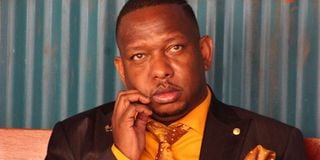Premium
Sonko loses bid to suspend his prosecution in Sh357 million graft case

Nairobi Governor Mike Sonko when he appeared before Senior Principal Magistrate Peter Ooko at the Milimani Law Courts on September 17, 2020.
Nairobi Governor Mike Sonko has lost a bid to suspend his prosecution in a Sh357 million graft case.
Sonko wanted the trial halted pending determination of a petition in which he is seeking a declaration that the trial was prejudicial and a violation of his fundamental rights and freedoms as guaranteed by the Constitution.
In the petition filed at the High Court in Machakos, the governor sought a declaration that there is no cure once the right to a fair trial is violated and that he would, therefore, be entitled to an acquittal, notwithstanding the nature of the evidence against him.
Through lawyer Cecil Miller, Sonko also sought an order prohibiting the chief magistrate of the Milimani Anti-Corruption Court from hearing or presiding over the conduct of three graft cases, in which he and others including contractors are charged with costing the county that amount of money.
Justice George Odunga declined to issue the orders on Friday, and instead directed that the petition be transferred to the Nairobi Anti-corruption and Economic Crimes Division
“That division is competent enough to refer the matter to the Chief Justice as sought, as well as determine whether the judges mentioned can excuse themselves from hearing the matter,” said Justice Odunga.
The judge noted that Sonko wants CJ David Maraga to appoint a bench of an uneven number of judges, numbering not less than three, to determine novel issues of law that he raised, such as the constitutionality of the Witness Protection Act.
Prosecution witnesses
The governor also wants the bench not to be composed of judges Mumbi Ngugi, John Onyiego and James Wakiaga.
Sonko is against the decision of the Director of Public Prosecutions (DPP) to turn his three co-accused persons in the graft case into prosecution witnesses.
He says it was in bad faith and an abuse of power for the DPP, Ethics and Anti-Corruption Commission (EACC) and Directorate of Criminal Investigations (DCI) to turn directors of Web Tribe Ltd, trading as Jambopay, to prosecution witnesses. The directors are Danson Muchemi and Robert Muriithi.
“They were guided by conniving, conspiracy, fraud, discrimination, and a biased, illegal, unjustifiable and unconstitutional turn of events, hence occasioning loss of public funds. They withdrew the charges against the three so as to testify against the accused persons, including the petitioner,” he told the court.
Sonko further notes that at the hearing of the graft case, prosecution witness No 2, who had been classified as a protected witness, identified himself as Danson Muchemi, defeating the purposes of placing him under witness protection.
The court heard that Mr Muchemi was initially a suspect in one of the graft cases involving the governor.
But the DPP “discriminately and in abuse of his powers entered into an illegal and unholy alliance to exonerate, excuse and protect him from glaring culpability by withdrawing and dropping the charges against him”.
According to the governor, Mr Muchemi was adversely mentioned in the graft case, therefore the DPP’s criteria of “cherry picking” who can be a State witness is fraught with irregularities and illegalities, and is invalid.”
The governor informed the court that Mr Muchemi had also been charged with 19 other persons with embezzlement of public funds amounting to over Sh1.1 billion, belonging to the National Health Insurance Fund (NHIF).
The DPP also withdrew charges against Mr Muchemi in that NHIF case and turned him into a prosecution witness.
In the governor’s view, Mr Muchemi and Web Tribe cannot have rightfully, lawfully and constitutionally obtained pardon from the public through the DPP.
He argues that the public is condemned to suffer double and multiple jeopardy due to loss of funds at the NHIF heist and Sh15 billion at the county government.
Fair hearing
Sonko also accuses the DPP of violating his right to a fair hearing by redacting full witness statements and documents.
He says he has the right to be informed in advance of the evidence the prosecution intends to rely on, and to have reasonable access to it.
“The respondent’s omission, of providing the petitioner with original copies of the documents they intend to rely upon, violates his right to a fair trial as enshrined under Article 50 (2) (k) of the Constitution, which includes the right to adduce and challenge evidence,” reads the petition.
Regarding operationalisation and application of the Witness Protection Act, the governor says rules and regulations made under the law are unconstitutional, as a result of how they have been applied in his case.
He says the application of the regulations has resulted in denying the accused persons the fullest extent of disclosure of documents, evidence and witness statements.
Sonko further says all stakeholders have been denied a chance to objectively interrogate the evidence against them.
“The implementation of the law and the rules should avoid issues of conflict of interest, objectivity and legitimate expectation regarding the implementation of the principles of fair trial. They should protect all stakeholders in the criminal justice system, including the accused persons,” says the governor.





